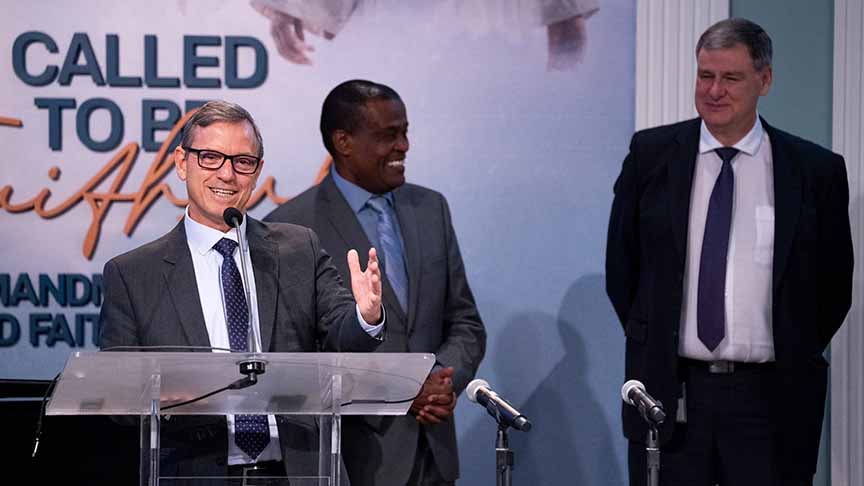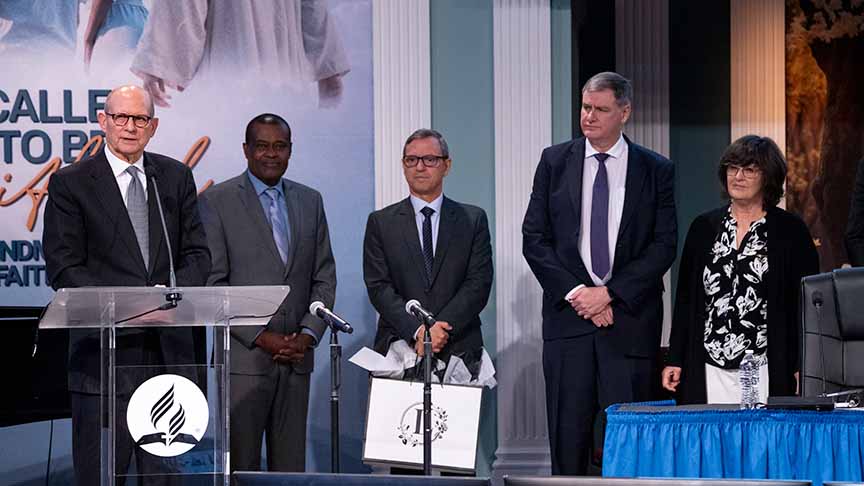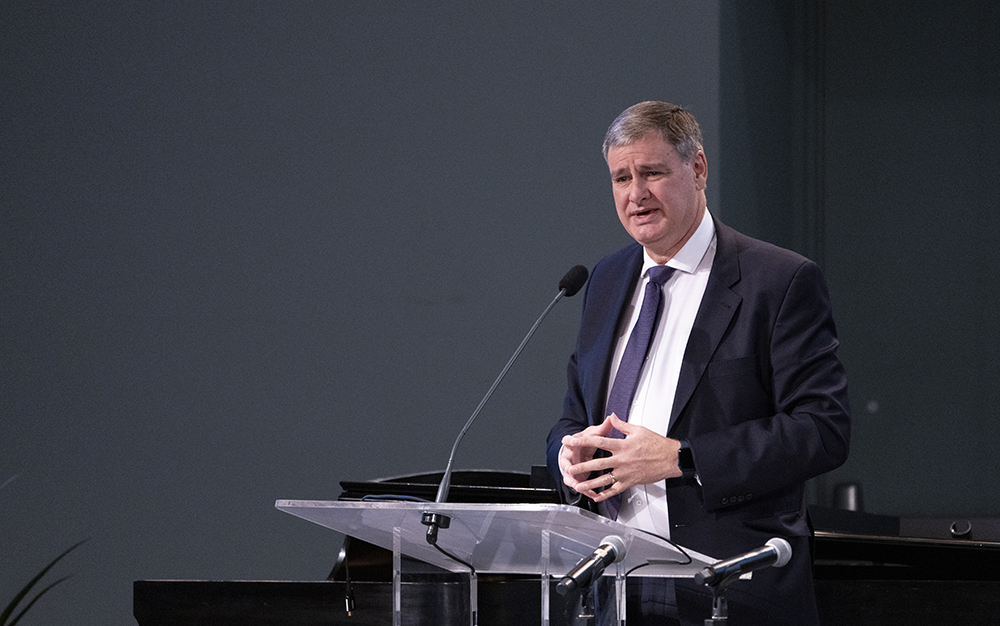Update on ADRA Discusses Agency Changes, Sets the Record Straight
Agency faces major funding reductions as a new leader takes over.
April 15, 2025 | Silver Spring, Maryland, United States | Marcos Paseggi, Adventist Review
“ADRA [Adventist Development and Relief Agency] is a wonderful agency that has existed for decades, helping people in the name of Christ physically, mentally, socially, and spiritually,” said General Conference (GC) president Ted N. C. Wilson while introducing an update report on the Adventist Development and Relief Agency. The presentation took place during the second day of the Spring Meeting of the GC Executive Committee (EXCOM) in Silver Spring, Maryland, United States, April 9.
Wilson thanked Michael Kruger, who left his position as ADRA president at the end of March to transition to Adventist HealthCare. “We are extremely grateful for what he has done,” Wilson said.

Paulo Lopes, new Adventist Development Relief Agency (ADRA) International president, shares with members of the GC Executive Committee about his past engagement with ADRA and his future plans during Spring Meeting in Silver Spring, Maryland, United States. [Photo: Enno Müller, Adventist Review]
Wilson explained that “almost at the same time, but in no way related, certain developments here with the United States government took place.” Wilson explained that those changes “have put in jeopardy many programs, not only with ADRA, but with many nongovernmental organizations that serve in humanitarian ways because of the reduction in budgets.”
He shared that as the humanitarian arm of the Adventist Church, ADRA is now “reacting and trying to find ways to respond to that reduction in finances.”
In his address minutes later Kruger acknowledged that the recent “collapse of USAID [United States Agency for International Development] has had a very material impact on ADRA, not only on ADRA International [at the agency’s headquarters] but on ADRA globally.” He explained that USAID funds were responsible for sustaining “the infrastructure and the framework of ADRA’s work globally.” ADRA now is working to determine how to “continue in a different way,” he said. “There will be changes coming.”
Addressing Rumors and Allegations
In his opening words Wilson also acknowledged that regarding ADRA, lately “there have been some completely false rumors, innuendos, [and] allegations that have spread through social media.”

Ted N. C. Wilson, president of the General Conference, shares his appreciation for the work of Michael Kruger, former president of Adventist Development and Relief Agency (ADRA) International, and welcomes incoming president Paulo Lopes. [Photo: Enno Müller, Adventist Review]
“You can be purveyors of truth,” Wilson told the assembly. “I want us, by God’s grace, to build back complete confidence on the part of our Seventh-day Adventist members in the Adventist Development and Relief Agency, and I want you to be an agent in doing that.”
Setting the Record Straight
As part of his remarks, Kruger built on what Wilson had alluded to. Kruger reminded EXCOM members that we are living “in a world of misinformation and disinformation.” For many years, he added, ADRA was spared from many of the accusations that other bodies have faced. But that began to change in the last few years, he acknowledged.
Kruger then tried to set the record straight. Regarding the accusation that ADRA facilitates, either directly or indirectly, illegal migration to the United States. “ADRA does work with migrants and people on the move,” he acknowledged. “These are some of the most desperate people on the planet.” Probably the largest intervention assisting migrants took place in Ukraine, he shared, as millions moved west to escape from war. ADRA works in partnership with agencies and governments to help those people to resettle. But “this accusation that ADRA works basically as a ‘coyote’ in the southern border of the United States is patently false,” he emphasized. “It’s not the way that we work; it’s not what we do.”

Michael Kruger, former president of Adventist Development and Relief Agency (ADRA) International, speaks during Spring Meeting to members of the GC Executive Committee. [Photo: Enno Müller]
Kruger also referred to an accusation that he himself had a seven-figure salary, which he said was false. “I don’t know where people get this information, but . . . it creates all kinds of distortions in the messaging. It has created all kinds of misunderstandings with our donors and supporters,” as they are now trying to figure out “where the truth genuinely lies.”
A New President
During the ADRA update GC general vice president and ADRA board chair Geoffrey Mbwana also thanked Kruger for his vision and support during the years at the helm of the humanitarian agency, as he introduced the new president, Paulo Lopes, who took over in April. He emphasized Lopes’s experience, including, more recently, ADRA director in the South American Division. “He led a dramatic growth in the level of impact ADRA made in the region,” Mbwana said.
Kruger agreed. “Paulo is a man of God,” he said. “I have seen him operate, and I know that ADRA is in very good hands.”
In his remarks Lopes said that if there’s a reason he was standing there, it was “by the grace of God.” He acknowledged that they have been working to ensure a smooth transition “and no gaps in leadership” at ADRA International.
Regarding the current challenges ADRA is facing, Lopes acknowledged that the agency is “going through a difficult time,” which included a reduction of its workforce at the ADRA International headquarters. He lamented the loss of some colleagues, but emphasized that “every crisis comes with an opportunity for growth.” He added, “We are assessing how we work, whom we will work with, and even what ADRA will look like in the future, so we can rebound from this crisis stronger and more resilient for what comes next.”
Lopes was adamant. “We are not intimidated by [the current challenges], because we have a great God,” he said. “The One who owns ADRA; the One who has always provided for ADRA, . . . will keep providing in the future.”